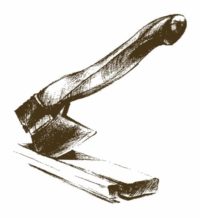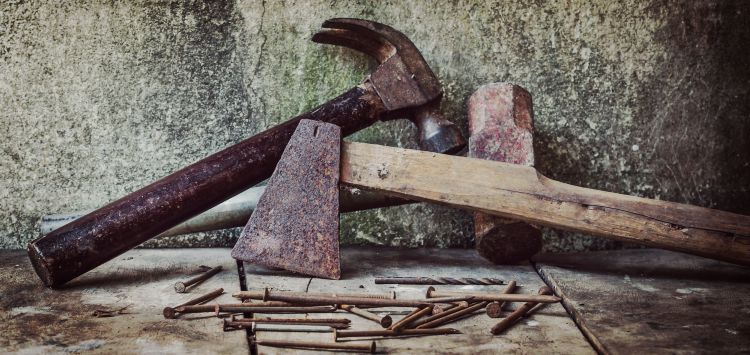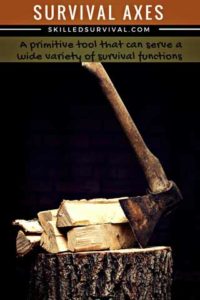
Because axes are a primitive, lifesaving tool. And nowadays there are hundreds to choose from:
- Some are built to be insanely light
- Others serve multiple functions
- Some are simple, while others are complex
So it’s no longer an easy choice. It’s a decision that requires forethought, self-analysis, and research…
TOPICS IN THIS GUIDE… ↓(click to jump)
- Best Axes For Survival
- What’s A “Survival” Axe?
- The Basic Parts Of An Axe
- Best Axe Features To Look For
- The Many Uses Of An Axe
- How To Care For An Axe
- Dispelling 5 Axe Myths
Best Axes For Survival Today
If you are not afraid of investing a few dollars, this option is for you.
These axes have been made in Sweden by the Gransfors Bruks.
And when it comes to axes and hatchets these guys are the luxury option.
Their axes are perfectly balanced, fit comfortably in your hands, and are forged using sophisticated techniques.
This ensures durability and longevity.
All their axes come with a hickory handle and leather blade sheath.
↓ The Best Survival Axe?
Fiskars makes one of the lightest weight, most durable, and cheapest options available.
The handle of this axe is made from “shock-absorbing FiberComp. This helps to make the axe lightweight, extremely durable, and very flexible.
At this reasonable price point, it's one of the most economical options you will find anywhere.
And on top of all that, it comes with a lifetime warranty. So if you ever do break it or damage it, you can send it back, and Fiskars will work with you to replace it.
↓ Fiskars Lightweight Chopping Axe
Estwing makes this lightweight axe has an axe head forged from steel.
Its blade is 4” long, making it better at cutting into things.
The axe has a rubber grip at the bottom of the handle to make it easier to hold and swing.
This axe also comes with an embossed leather sheath.
↓ Estwing 26 Inch Camp Axe
Basic, simple, cheap.
The Cold Steel Boss is forged with 1055 carbon steel and fixed with an American Hickory handle.
This is the axe you think of when someone talks about lumberjacking. This axe design has stood the test of time.
↓ Testing The Cheapest Axe On Amazon
Yes, Husqvarna IS a very odd name for a company but who cares, they make a great axe.
Drop-forged blade & head geometry adapted to different applications for an easy entry into the wood & best splitting performance.
This is a universal axe made for different kinds of work (like construction or forest work).
Composite fibreglass handle with hammer axe head function.
↓ Fiskars Husqvarna Axe
This Maul Axe is ideal for splitting wood (or splitting faces) or driving wedges and stakes (driving face).
IsoCore Shock Control System absorbs strike shock and vibration to reduce the punishment your body takes, transferring 2X less shock and vibration than wood handles.
The insulation sleeve captures the initial strike shock before it can reach your hand.
Plus, it comes with a full lifetime warranty if you happen to damage this beast (which I doubt you will).
↓ Fiskars 8 lb. Maul Splitting Maul
What’s A “Survival” Axe Anyway?
“An axe cuts through a forest, not because of its size, but its endurance.” – Motshona Dhliwayo
People get axes, tomahawks, and hatchets confused. So let’s clear the air before we get started…
- Hatchets and tomahawks are less than 12” in overall length (with a short handle)
- Axes are usually longer than 22 inches (with a longer handle length)
Simply put, axes are bigger and longer than hatchets. So they’re heavier and harder to transport.
I’ve never met a backpacker carrying an axe. It’s big, heavy, and takes up too much pack space. An axe is a terrible addition to your bug-out bag. Instead, consider a lightweight survival hatchet for that.
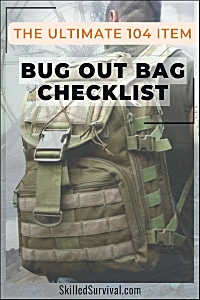
Want a free 104 item bug out bag checklist?
Enter your email below to instantly download this Complete Checklist PDF. No purchase necessary. 👇 👇For the rest of us:
An axe is great for your:
- vehicle
- garage
- tool shed
- family cabin
- or remote bug-out location
Full-sized axes should be considered stationary tools.
So what makes an axe an axe worthy of survival? The honest answer…nothing. A survival axe is an axe you buy for survival purposes.
Most axes don’t have any frills. You won’t find many multi-tool axes. When you do, they tend to be gimmicky.
Instead, you want a solid, proven axe that will last years. That, my friend, is a “survival axe.”
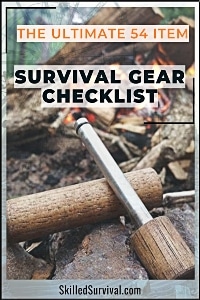
Want a free 54 item survival gear checklist?
Enter your email below to instantly download this Complete Checklist PDF. No purchase necessary. 👇 👇The Basic Parts Of An Axe
Every axe is comprised of only a few key elements:
The Blade
The blade is the soul of your axe. If the blade ever chips or cracks; it’s time to invest in a new one.
The best blades are forged with high-carbon steel. These keep their edge for the longest time possible.
The Handle
This long piece of straight-grained wood is the part you hold.
Today, many axe manufacturers have switched from a wooden to fiberglass Some even use plastic or metal. These materials increase durability and make the axe lighter.
The Head
Many axe heads use low-carbon steel. While using high-carbon steel for the blades.
This gives the axe head more flex and increases it’s durability.
The Eye
The the hole in your axes head, where the handle attaches.
The Lug
This is part of the axe head on either side of the handle. At the bottom of the head. This protrusion fastens the head to the handle.
The Butt
The hammer-like surface of the back of the axe head.
Best Survival Axe Features To Look For
Some important axe features are as follows:
Balance
An unbalanced axe will not swing properly. And is more liable to break. That’s why it’s important to feel it in your hands.
Swing it, balance it, get an idea of the weight distribution, etc. Only then, will you know a balanced vs. unbalanced axes.
Durability
Your axe must be durable.
They’re built to swing at hard objects with a massive force. If your axe can not handle the stress, it will break.
There are a lot of factors that go into durability.
- One is the type of metal it was forged from (high or low-carbon steel).
- Another is the material the axe handle comprises.
- And a third is how you care for it.
The bottom line:
You want your axe to be so strong you can use it as a pry bar.
Weight
If you plan on carrying your axe all over the place, invest in a hatchet.
Axes are too heavy for long-distance travel (without a vehicle). That being said: Some axes are heavier than others and THAT makes a difference.
Now you don’t want something light as a feather. THAT won’t generate enough momentum to split wood. But you also don’t want an axe that’s bulky and cumbersome.
Finding a balance between the two is important.

Want a free 54 item survival gear checklist?
Enter your email below to instantly download this Complete Checklist PDF. No purchase necessary. 👇 👇The Many Uses Of An Axe
So, now you have an axe. What do you do with it? An axe allows you to:
- defend yourself
- fashion new tools and weapons
- start fires
- build shelters
- process game
- fell trees
Heck, you can even shave with a sharp axe!
↓ How To Shave With An Axe
This is a real weapon. It’s a dangerous tool that can cause lacerations, dismemberment, and death. So treat the blade with respect.
It’s a tool that can achieve almost any number of ends. Its versatility is a factor of your imagination. If you can think of it, you can do it with an axe.
Cutting Trees
Axes are good for bringing down trees. And chopping them into segments for lumber. It’s one of the original purposes of the tool.
Chopping Firewood
Another classic job for an axe. Chopping wood is a useful activity. But it is therapeutic and is proven to increase testosterone levels in men.
Self Defense Weapon
There is a substantial difference between a battle axe and a utility axe. But that does not mean a utility axe cannot do damage.
Axes are a weapon even older than the sword. And if you need to swing that thing at an attacker, it will do damage.
Collecting Wood
Axes generate maximum blunt force, which can be used to break dead branches off of trees.
Processing Game
Sharpen your axe and it can be used to clean and skin game.
- Decapitate your prey
- slice it open
- gut it
- and skin it with your trusty axe
Shaping Pine Boughs
If you have a sharp enough axe, you can shave and shape pine boughs. For an in-depth guide on how to do this, check out this article. Which goes into the minute details of building a longbow from scratch.
Shaving
Shave like a real man: with the blade of your axe.
This task takes precision. And if you are trying it for the first time, expect a couple of gashes. But there is nothing like a razor shave from an axe.
Opening Bottles
Yes, you can smash bottles with an axe to get them open. But THAT’s not what I’m talking about.
If you wedge the blade under the bottle cap and add leverage, the bottle will pop open.
Making Fire
Find yourself a piece of flint and start striking.
Be careful not to hit directly down upon the rock. Otherwise you’ll blunt your axe’s blade and risk fracturing it irreparably. Instead, strike your flint/rock at an angle until sparks start flying.
Throwing
Many people throw axes for no other reason than for fun. It’s a hobby! And one that requires a lot of practice.
It is also a dangerous sport. So don’t get careless just because you’re having fun.
Caring For Your Axe
Just like any tool, an axe requires maintenance. If you leave it outside, through rain and snow it won’t last.
Sharpening Your Axe
As with knives and swords, sharpening the blade is essential to its usefulness.
A dull axe blade isn’t much good against a tree.
For on-the-go sharpening, get an axe Whetstone. The difference between ones for knives vs. axes is the shape.
Here is a video detailing how to sharpen your axe blade.
↓ How To Sharpen Your New Axe
You want to massage the blade carefully.
Sort of like the dentist tells you to brush your teeth. Gently and in small circles.
Replacing the Head/Handle
A highly used axe will eventually need a new head. Sad as it may be, it’s just a fact of life.
Check if the manufacturer offers a warranty before buying a new one!
They might send you a new one if you send them the busted one.
A lot of times, though, if you have to pay for a new axe head. So you might as well buy a new axe (unless you’re attached to your axe handle).
Similarly, handles don’t last forever, especially if made from wood. Wood is particularly susceptible to breaking, splintering, and rotting. But even plastic and fiberglass handles wear out.
Hammer the old handle through the eye of the axe head. And thread the new one.
Axe handles are available at most hardware stores. Or you can shop on Amazon for them.
Avoiding Rust
Rust is the enemy of all blades. It undermines the structural integrity of the metal and dulls its sharpness.
To avoid this, keep it inside, away from moisture.
Many axes come with leather or nylon sheaths. These also help keep the blade fresh and rust-free.
If you run into some rust, there’s a quick fix: Vapor Rust.
↓ Polishing A Rusty Axe
Also, WD-40 on a rag works.
Wipe your blade down and watch the rust disappear. You can even treat your leather sheath with a little WD-40. This will re-oil the blade every time you put it away.
Dispelling The 5 Most Dangerous Axe Myths…
Myth 1: “Bigger is Always Better!”
Some folks think the biggest, heaviest axe is best. But in reality, a massive axe can be unwieldy to us. And exhausting.
A more manageable size and weight are essential for precise cutting. And less fatigue in a survival situation is always a plus.
Myth 2: “Axes are Just for Chopping Wood!”
While axes are great for cutting wood, duh! But they’re not limited to that. They can also:
- split
- hammer
- dig
- and defend
Knowing the multiple uses is a game-changer.
Myth 3: “Any Axe Will Do!”
Not all axes are created equal. Some people think any old axe will suffice. But THAT’s naïve.
It’s essential to choose a durable one designed for the tasks you’ll face.
Myth 4: “A Sharp Axe is a Dangerous Axe!”
Some folks believe a dull axe is safer because it won’t cut as easily. But in reality, a sharp axe is much safer.
Why? Because it requires less effort and is more predictable in its cuts. Keeping your axe sharp is crucial for safety and efficiency.
Myth 5: “Axes are Easy to Use – Anyone Can Swing One!”
Just because ANYONE can swing an axe… Doesn’t mean they’re doing it right. It takes skill and practice to be most effective.
Without the right knowledge, you risk injury and wasting energy. So, learn how to swing your axe properly.
The Final Word
EVERYONE should own a tool as versatile and useful as an axe. It’s a single tool that can do a million different tasks.
It’s like having a complete survival kit built into a single badass tool.
Keep one in your car, garage, or country cabin. Heck, even put one at your Bug Out Location, so you don’t have to lug one all the way there.
That way, when the IT hits the fan, you’ll have a trusty axe for survival.

Prepare, Adapt & Overcome,
P.s. - I just found out 2 out of 3 Americans don’t feel prepared for a 3 day disaster!!!
I guess this goes to show how modern society continues to embrace ‘living a fragile life.’ What’s crazy is… it’s so easy to fix.
To make sure YOU have the basics, watch our FREE training on “10 Simple Steps To Basic Preparedness” that shows you HOW.
Nothing crazy here… this isn’t doomsday prepping... just the basics every responsible adult should have before a disaster strikes.Why You Can Trust Skilled Survival...
Go here now to review a full breakdown of:
- Who We Are
- Our Credentials
- Our Mission
- & Product Recommendations...
Here are a few highlights of our teams credentials & certifications:
- Certified Member of a Mountain Search & Rescue Organization
- Plant Emergency & Safety Leader for a Major Food Manufacturer
- Member of the 10TH Mountain Division Hut Association
- Certifications: Avalanche 1, WFR, CPR
- Official Gear Tester for Numerous Outdoor Gear Companies
- Countless Multiday Backpacking trips into Remote Wilderness
- Bachelor's Degree In Mechanical Engineering
- Bachelor's Degree In Civil Engineering
- Bachelor's Degree In Biomedical Engineering
"It takes 20 years to build a reputation and five minutes to ruin it." - Warren Buffett
We're fully aware that trust is NOT something you GET but is EARNED.
And we'll continue to earn YOUR trust through our forthright and honest approach with each new Blog Post, Guide & Product we create...
P.s - I just took this FREE 60-second 'Readiness Score Quiz'👇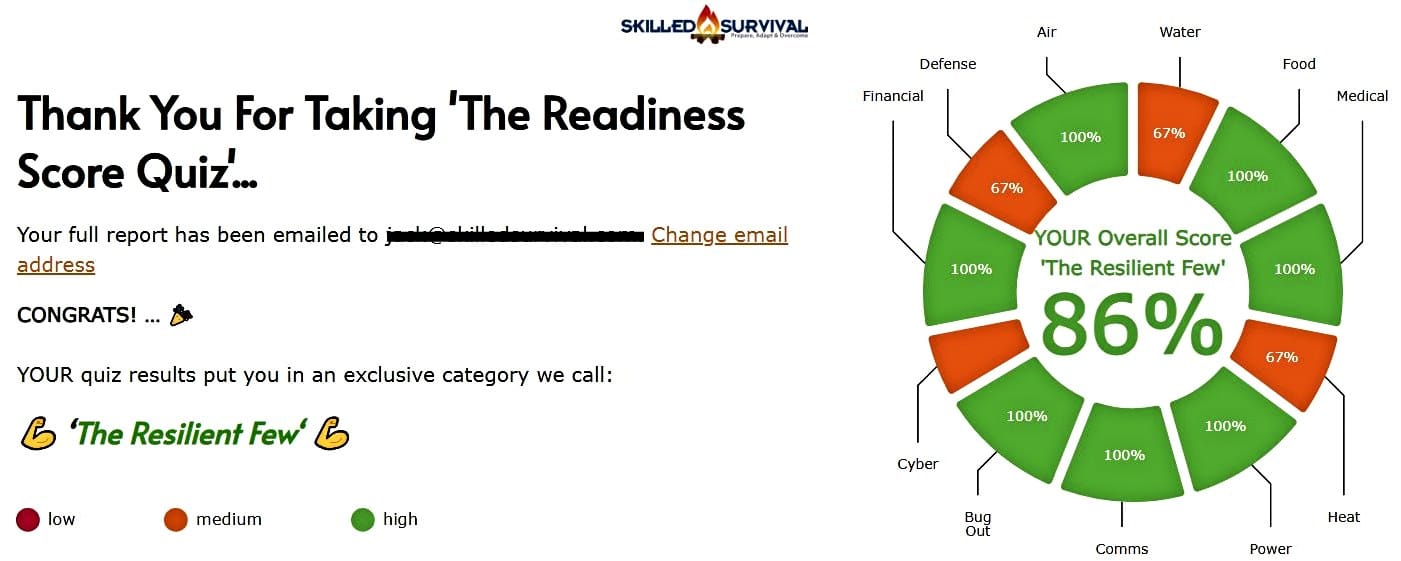
AND... I've still got a few gaps in my preps...🤔 But at least, I'm not part of 'The Fragile Masses'. 👍 Find out where YOU stand by answering a few questions...

Recommended Reading
LifeStraw Review: An Expert Puts It To The Ultimate Test
LifeStraw Review - with no moving parts, chemical additions, or batteries, it provides a lightweight, compact filter to treat up to 4000L...
Best Survival Bow: 16 Surprising Reasons YOU Should Get One
A survival bow is one of the most underappreciated weapons I think EVERYONE should own. Here are 16 reasons why YOU should get one today.
Best Survival Hatchets: Tough Enough To Outlast The Wild
Not all hatchets are created equal. A quality survival hatchet can do tasks even a survival knife cannot. Here's the one I carry in my pack.
Best Survival Radios: Why You Must Secure One (before SHTF)
Be the ONE who knows what the hell is going on after SHTF. Here's how to set yourself up with a reliable survival radio in a future disaster.
Best EDC Flashlight: Simple, Small, Compact & Super Bright
The best edc flashlight is durable, bright, compact and worth carrying! In this guide, we review the best one to make your search easy.
11 Proven DIY Survival Gear Projects ANYONE Can Follow
Building DIY survival gear doesn't NEED to be complicated to be effective. Here are the 11 best projects you can finish in just a few hours.







